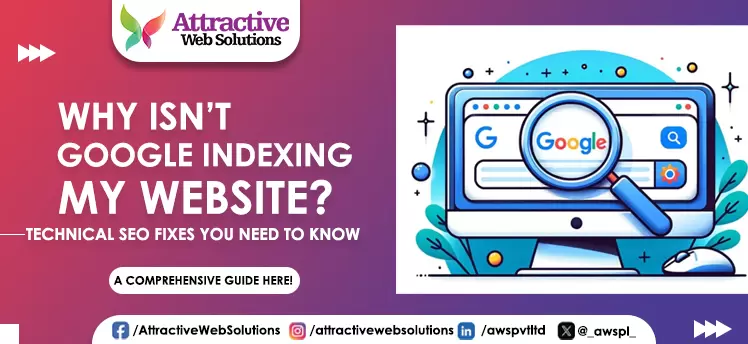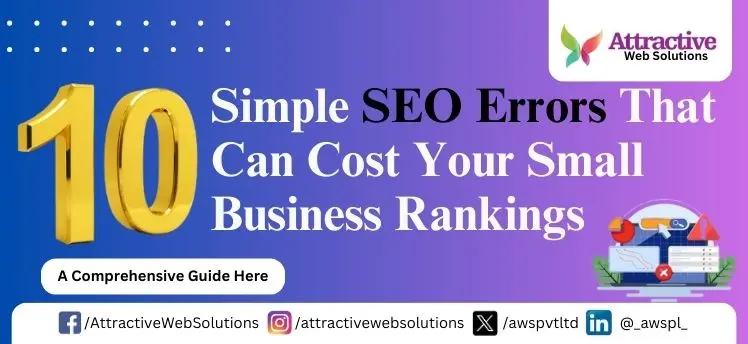Imagine launching a beautiful, content-rich website only to discover that it doesn’t appear on Google. It’s frustrating, right? Google indexing is crucial for your website’s visibility in search results, and if it isn’t happening, all your hard work can feel wasted.
In this guide, we’ll explore why your website might not be indexed by Google, the technical SEO fixes you need, and how to ensure your site gets the visibility it deserves.
What is Google Indexing?
Google indexing is the process by which Google crawls your website and adds its pages to its search engine database. Once indexed, your pages can appear in Google search results when users enter relevant queries.
How Does Indexing Work?
- Crawling: Google’s bots (also known as crawlers or spiders) scan your website.
- Processing: Google analyzes the content of your pages, including metadata, keywords, and links.
- Indexing: If your pages meet Google’s criteria, they’re added to its index, making them eligible to rank in search results.
If your site isn’t indexed, it simply doesn’t exist in the eyes of Google.
Why Isn’t Google Indexing My Website?
There can be several reasons why Google isn’t indexing your website. Let’s break them down and explore the solutions.
1. Your Website is New
When a website is newly launched, it takes time for Google to discover and index it.
Solution:
- Submit your website to Google using the URL Inspection Tool in Google Search Console.
- Create and submit an XML sitemap through Google Search Console to guide Google’s crawlers.
2. Robots.txt Blocking Crawlers
A misconfigured robots.txt file can unintentionally block Google from crawling your website.
Solution:
- Check your
robots.txtfile by visitingyourdomain.com/robots.txt. - Ensure it doesn’t contain a
Disallowdirective for essential pages or the entire site.
Example of an Issue:
User-agent: *
Disallow: /
This blocks all bots from crawling your website.
Correct Configuration:
User-agent: *
Allow: /
3. Meta Robots Tag with “Noindex”
If your web pages have a meta robots tag with a noindex directive, Google won’t index them.
Solution:
- Review your page headers or source code for this tag: <meta name="robots" content="noindex">
- Remove or update the tag to
index: <meta name="robots" content="index, follow">
4. Poor Website Structure
A messy or unclear website structure can confuse crawlers, making it difficult for them to navigate your site.
Solution:
- Organize your site hierarchy with logical menus and categories.
- Use internal links to connect your pages, making navigation easier for crawlers and users.
5. No XML Sitemap
An XML sitemap acts as a roadmap for search engines. Without it, Google may not know which pages to crawl and index.
Solution:
- Generate an XML sitemap using tools like Yoast SEO (for WordPress) or Screaming Frog.
- Submit the sitemap through Google Search Console.
6. Slow Website Speed
Google prioritizes fast-loading websites. If your site is slow, crawlers might abandon it before indexing all your pages.
Solution:
- Test your site speed using Google PageSpeed Insights.
- Optimize images, enable caching, and use a Content Delivery Network (CDN).
7. Duplicate Content Issues
Duplicate content can confuse search engines, leading to some pages being excluded from indexing.
Solution:
- Use tools like Siteliner to identify duplicate content.
- Set canonical tags to indicate the preferred version of a page: <link rel="canonical" href="https://www.example.com/preferred-page" />
8. Penalties from Google
If your website violates Google’s guidelines (e.g., keyword stuffing, cloaking), it might be penalized and excluded from the index.
Solution:
- Check for penalties in Google Search Console under Manual Actions.
- Resolve the issues by adhering to Google’s Webmaster Guidelines.
9. Insufficient Backlinks
Backlinks are like bridges connecting your site to the web. Without them, Google might not discover your website.
Solution:
- Build high-quality backlinks from authoritative websites in your niche.
- Use tools like Ahrefs or SEMrush to identify backlink opportunities.
10. Dynamic or JavaScript-Heavy Content
Google’s crawlers sometimes struggle with dynamic or JavaScript-rendered content, leaving it unindexed.
Solution:
- Use server-side rendering (SSR) to deliver fully-rendered HTML to crawlers.
- Test how Google sees your content with the Mobile-Friendly Test tool.
How to Check If Your Website is Indexed
1. Use Google Search
Enter site:yourdomain.com in Google’s search bar. This shows all indexed pages for your domain.
2. Check Google Search Console
- Go to Coverage Report in Search Console.
- Review indexed and excluded pages.
3. Use URL Inspection Tool
Enter a specific URL to check its indexing status and see any issues preventing indexing.
Technical SEO Fixes to Get Your Website Indexed
1. Optimize Crawl Budget
Google allocates a limited crawl budget for your site. Use it wisely:
- Block unnecessary pages (e.g., archives, tags) using
robots.txt. - Fix broken links and redirect chains.
2. Improve Mobile-Friendliness
Google uses mobile-first indexing, so your site must work flawlessly on mobile devices:
- Use responsive design.
- Ensure clickable elements are appropriately sized.
3. Leverage Structured Data
Implement structured data (e.g., schema markup) to help Google understand your content better:
- Use tools like Google’s Rich Results Test to validate your schema.
4. Fix Broken Links
Broken links frustrate crawlers and users. Use tools like Broken Link Checker to find and fix them.
5. Regularly Update Your Sitemap
Ensure your XML sitemap reflects your latest content:
- Remove outdated pages.
- Include newly published content.
Common Mistakes to Avoid
1. Ignoring Search Console Errors
Failing to address errors reported in Search Console can lead to indexing issues.
2. Not Testing Robots.txt
A misconfigured robots.txt file can accidentally block crucial pages.
3. Forgetting Canonical Tags
Without canonical tags, duplicate content issues can harm your indexing and rankings.
4. Overlooking HTTPS
Google prioritizes secure websites. If your site lacks an SSL certificate, it may be excluded.
How Attractive Web Solutions Can Help
Struggling with Google indexing? At Attractive Web Solutions, we specialize in technical SEO audits and optimization. Here’s how we can help:
- Diagnose indexing issues using advanced tools.
- Optimize your website’s structure, speed, and crawlability.
- Implement best practices to improve your search visibility.
Conclusion
Google not indexing your website is a solvable problem, but it requires a systematic approach. By understanding the common reasons for indexing issues and implementing the right technical SEO fixes, you can ensure your website gets the visibility it deserves.
Remember, indexing is just the first step. To rank well, focus on creating valuable content, building high-quality backlinks, and maintaining a user-friendly website.
Need expert help? Contact Attractive Web Solutions today to unlock your website’s full potential!









0 Comments